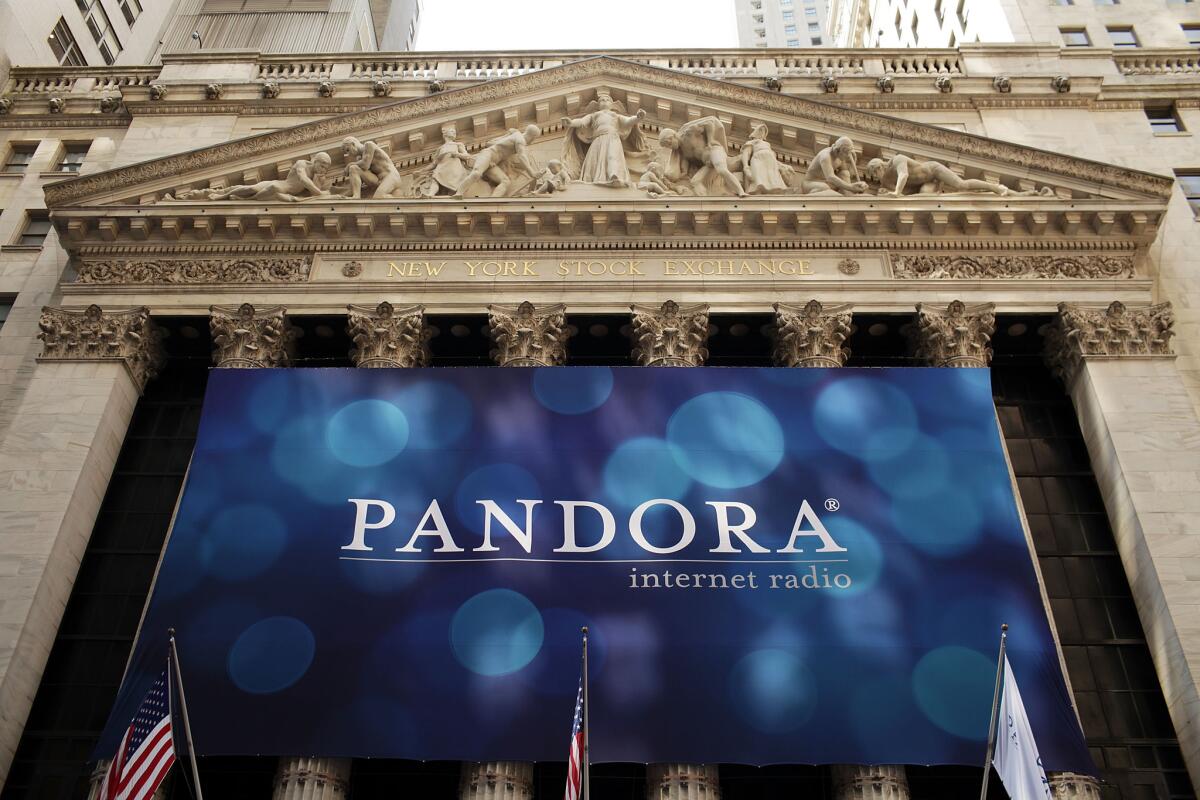Pandora loses royalty rate court fight to publisher group BMI

A banner for Pandora hangs in front of the
- Share via
Internet radio giant Pandora Media Inc. lost a key legal battle in the decades-long, wide-ranging fight over how musicians and music copyright owners are paid for their work
A federal district court in New York on Thursday ruled in favor of BMI — Broadcast Music Inc. — which has a huge roster of popular songwriters including Lady Gaga, Miranda Lambert and Sam Smith. The group had asked the court to raise Pandora’s payments to 2.5% of its revenue from 1.75%.
The increase probably will boost the amount of money that Pandora pays to BMI by only a few million dollars annually, according to analyst estimates. About half of Pandora’s revenue, which last year was $921 million, is paid to rights holders that include record labels and music publishers.
Oakland-based Pandora, which has 79 million active users, had racked up a series of recent victories regarding royalty payments. BMI and its competitor ASCAP, known as performing rights organizations, collect royalties from the use of their members’ songs and compositions on radio, television and Internet services. The organizations do not represent performers or record labels.
BMI hailed the decision as “an enormous victory” for its more than 650,000 songwriters, composers and publishers.
The ruling follows two recent legal victories for Pandora. A federal appeals court last week ruled against ASCAP to keep Pandora’s rate at 1.85%, agreeing with a lower court.
In a separate dispute, the Federal Communications Commission recently cleared the way for Pandora to buy a South Dakota terrestrial radio station. Pandora hopes that move will help it argue that it should quality for the lower royalties paid to BMI and ASCAP by traditional broadcast radio companies. Pandora purchased the South Dakota station, subject to regulatory approval, in 2013.
Supporters of higher royalties said that the BMI ruling is a welcome shift in the status quo and that they hope it will lead to future victories.
David Israelite, president and chief executive of the National Music Publishers’ Assn., called the ruling by U.S. District Judge Louis Stanton a “positive first step” for the publishing and songwriting community.
“While still a small fraction of what music creators deserve, this decision sends a clear message that Pandora cannot continue to get away with growing its business on the backs of struggling songwriters — who deserve to be paid fair market value for their work,” he said in a statement.
Pandora pledged to appeal Thursday’s ruling.
“We remain confident in our legal position,” said David Grimaldi, Pandora’s head of public affairs. “We strongly believe the benchmarks cited by the court do not provide an appropriate competitive foundation for a market rate.”
The ongoing war over music royalties is taking place on multiple fronts. Last June, the Justice Department opened a review of its consent decrees governing BMI and ASCAP, which had asked for changes to the rules. The Justice Department invited comment from songwriters, composers, publishers, licensees, service providers and others as part of its review.
Separately, a coalition of artists, labels and other industry players have lined up to support the Fair Play, Fair Pay Act introduced in Congress this year. Among other things, the legislation would end broadcast radio’s long practice of not paying labels performance royalties. It would also seek to ensure that satellite and Internet radio companies pay labels for pre-1972 recordings.
Pandora’s stock fell 50 cents, or 2.7%, to $18.31 on Friday.
Wedbush Securities analyst Michael Pachter, who covers Pandora, said the monetary difference between 1.75% and 2.5% of revenue would not be a significant change. It’s “really a small loss,” he said.
But Rich Greenfield, an analyst for BTIG, said the development was “not a positive” for the Internet radio company. He called it a “sign of larger royalty costs everywhere you look.”
Follow Ryan Faughnder on Twitter for more entertainment business coverage: @rfaughnder
More to Read
Sign up for The Envelope
Get exclusive awards season news, in-depth interviews and columnist Glenn Whipp’s must-read analysis straight to your inbox.
You may occasionally receive promotional content from the Los Angeles Times.









